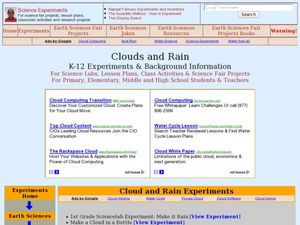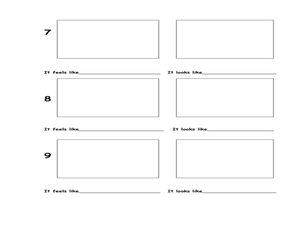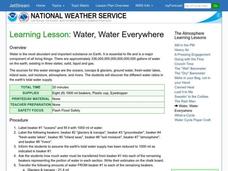Curated OER
Art/Ocean Scene
Students draw and color an ocean scene based on the paintings of Wyland. In this ocean art lesson plan, students view slides of seascapes before they complete their project using oil pastels.
Curated OER
Water Quality Tests Explained
Students identify the eight tests done to check for water quality. In this ecology lesson, students explain why it's important to test water in rivers. They explore sources of river water pollution.
Curated OER
Clouds and Rain
Young scholars study how clouds form, what different types there are and what rain is. In this atmospheric lesson students make a cloud and create evaporation.
Curated OER
Layering of Water
Students examine what happens when different types of water meet. In groups, they participate in an activity in which they combine different percentages of salt, fresh and brackish water and record their observations. They let the...
Curated OER
A Salty Experiment
Students study salty and fresh waters. In this harbor estuary lesson plan students complete a lab activity on salinity and describe what happened.
Curated OER
What is an Estuary?
Students define the terms estuary and watershed. They conduct an experiment to determine the density differences between fresh and saltwater. They examine the salinity distribution of the Peconic Bay Estuary.
Curated OER
Water Systems
In this water systems worksheet, students refer to their textbook to complete questions about the amount of water on earth and the portion of water in various forms. Students review porosity, permeability, and water table. This worksheet...
Curated OER
Wagons Test
Students examine the characteristics of different biomes. In this ecology lesson, students design biomes where given animals can live. They discuss the design within the group and share it with the class.
Curated OER
Water Density Boundaries
Students create observable layers in water that represent a separation based upon density differences. They model density boundaries using differences in temperature and salinity. They, in groups, perform a meaningful experiment...
Curated OER
Aquatic Communities
Students watch a video about aquatic communities. They conduct an experiment that shows how movement of rivers change the landscape. They compare fresh and salt water communities and its wildlife.
Curated OER
Snow vs. Water
Students fill three cups with snow. They record the height of snow in each cup, and allow the snow to melt. Students measure the height of the water in each glass or cup, and record their results on the worksheet. They answer questions...
Curated OER
The Floating Golf Ball
Fourth graders discuss density. In this floating golf ball lesson plan students complete a lab activity on density while working in groups.
Curated OER
Water Density and Stability Lab
Learners observe how different water densities and salinity control the depth at which different water masses occur. Submarines are used as a case study. This is a well-designed with an excellent worksheet.
Curated OER
Sink or Float?
Students predict and explore to discover which objects sink or float in fresh and salt water, predict how salt affect objects, write predictions on T chart, discuss difference between man-made and natural waters, and graph results.
Curated OER
Finding the Salt Front
Pupils discuss definitions of estuary, salinity, and the salt front. They listen as the teacher explains the Hudson River Miles and ways the upriver and downriver sections relate to the north and south. Students graph the salt front...
Curated OER
Water Quality Monitoring
Students comprehend the four parameters of water quality. They perform tests for salinity, dissolved oxygen, pH and clarity or turbidity. Students comprehend why scientists and environmental managers monitor water uality and aquatic...
Curated OER
Salmon Life Cycle
In this life cycle worksheet, students fill in the blanks with words about the life cycle of a salmon. Students complete 20 words about the life cycle.
Curated OER
The Romans: Public Health and Water
In this Ancient Rome worksheet, students read about the public health system of Ancient Rome: aqueducts, public baths and sewers.
Curated OER
Exploring Marine Objects
Learners identify the sources of water on Earth. In this life science lesson, students list the different plants and animals that live in the ocean. They explore marine objects in the lab and draw them.
Curated OER
Rivers for the Common Good
Students explore what effects improper waste disposal and water pollution have on the water cycle. They explore how philanthropic acts can help protect the water cycle and keep our water and planet clean.
Curated OER
Does a change in pH affect the growth and survival rate of aquatic plants?
Pupils determine if changes in pH affect the growth and survival rates of aquatic plants. They evaluate the optimal pH levels for the growth of aquatic plants.
Curated OER
Drop in the Bucket
Students study the sources for the water they use. They determine their town's major water supply and how many gallons per day does the population use.
Curated OER
Salmon Run
Students examine the life cycle of the Pacific salmon and the impact of humans on salmon migration. They watch a Powerpoint presentation, trace migration routes on satellite imagery, and complete mock calculations of salmon energy...
Curated OER
Water, Water Everywhere
Students estimate the amount of water that can be found in its various forms including oceans, lakes, glaciers, rivers, etc. They view a demonstration about water distribution and discuss flash flooding safety precautions.

























